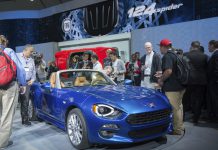
At NerdWallet, we stick to strict standards of editorial integrity that will help you make decisions with full confidence. Many or all the products featured here are from your partners. Here’s the way we make money.
Millennials, we’re told, are commitment-phobes.
From smartphones to Netflix, Americans under 35 embrace monthly obligations and wish only up-to-date technology. We move and change careers more than any other generation, so we love flexibility.
So why might leasing cars be our right diamond necklace? Because leasing delivers brand-new cars at affordable payments, and contracts typically last only three years.
“The idea of you’re going to keep [the car] for a long time, then you’re likely to transform it in and upgrade it to something different is attractive to a lot of people,” says Jessica Caldwell, executive director of industry analysis at Edmunds, an online resource for automotive information.
While 4 out of 5 car-owning millennials still believe their vehicle may be worth the hassle and expense, leasing keeps growing in popularity. Proportionally, millennials lease a lot more than any other age group. Based on Edmunds’ 2016 lease report, 34.2% of millennials lease rather than buy.?And based on a Goldman Sachs survey, only 15% of millennials think it’s “extremely important” to own an automobile.
This is really a?generation in flux: Our car needs can alter when we begin a family, move to another location or change careers.
“I don’t want to invest in [a type] of car right now,” says Will Colburn, a 22-year-old San fran resident. “Like right now a two-door is okay for my life, but you never know down the road? Also, I like cars, so I want to drive a lot of different ones within my lifetime.”
There are lots of benefits and drawbacks to leasing, so you’ll want to?think about these questions before committing. Below, a few of the reasons many millennials may choose leasing.
You’re covered under warranty
Most manufacturers offer free bumper-to-bumper warranties for that entirety of a lease. Several automakers, including Toyota and BMW, offer free maintenance programs for lessees.
“Most people want the hassle-free ownership experience,” Caldwell says. “They don’t want to necessarily take detailed ownership notes of when they get the car serviced and wrong.”
Free car servicing at the dealership doesn’t only save time and energy. AAA’s 2016 driving cost brochure estimated maintenance costs at 4.81 cents per mile for that average driver. Drivers between 20 and 34 have a tendency to accumulate higher mileage, an average of?15,000 annually. For them, free servicing?would add?as much as an average annual savings of more than $700.
According to some 2014 study by RepairPal, which certifies auto repair centers, 49% of repair shop owners believe millennials are the generation least prone to take care of their vehicles routinely. A free, manufacturer-backed warranty makes servicing easy.
Flexibility to change cars
While purchasing a used car is a better financial call in the long term, millennials might not be in a position to afford a high end?model at the outset of their career. When they try too early, they could get stuck having a beat-up ride for a long time.
If millennials?lease, they’ll pay essentially to book a car while they build their salaries and savings. Car brands like Honda and Toyota?have high residual value after the lease. That means automakers can lease?even their expensive models for?lower?payments than if the customer had purchased the car, knowing they’ll still earn money following the lease ends.
When the lease ends, millennials can purchase a car with better resale value, up-to-date technology and curb appeal -?or lease again. Or possibly by then we’ll Uber everywhere in self-driving cars. The point is, lessees have choices.
Doesn’t restrict cash flow
NerdWallet?recommends putting down as close to 20% from the vehicle price as possible if you’re buying a car outright. Conversely, leasing doesn’t require much cash upfront, and it’s noted for zero-down deals. For any budgeting millennial, failing to pay a large lump of money upfront could be a relief.?You can use a lease calculator to determine how the amount you pay upfront affects your monthly payment.
And while lessees don’t own?a car after their payments, lease payments are typically?23% lower?than monthly purchase payments – and the difference can be?higher. For instance, a 2016 Chevrolet Malibu Limited may cost $293 in monthly obligations to purchase but $185 per month to lease, based on Chevrolet estimates. Since millennials are still adapting to their regular bills and expenses, not being tied up in large payments will go quite a distance.
Updated technology
Millennials are known for being tech?lovers, and newer car features can be a lot of fun. Manufacturers such as Buick and GM have outfitted their cars with built-in Wi-Fi locations, and certain Kia and Ford child car seats can massage, heat and warm the driver.
More importantly, automakers have made incredible strides in motorist security features. Keeping an automobile for a decade or even more, while financially ideal, may leave your car noticeably behind in these upgrades.
What to look at out for
- Mileage caps:?Lease contracts limit the miles you’re allowed to drive, typically between 12,000 and 15,000 a year. Should you review your limit, you’ll face an excess-mileage penalty of 10 to 15 cents per mile.
- Wear and tear: Dealerships allow average deterioration, however your definition of average and theirs might not always line up. Parking lot dings or spilled soda in the back seat can also add upright.
- Hard to interrupt: Yes, leases are short, but when you need to do want to get out of them it can be difficult, and lease-breaking penalties usually are more costly than finishing the instalments. If your contract allows, you might be able to hand off?your lease to another person – but you may still be responsible if that person bails on payments.
- Credit: You will get the best lease deals with good credit, something which may affect millennials who haven’t had time for you to build strong scores.
Nicole Arata is really a staff writer at NerdWallet, an individual finance website. Email:[email protected].














